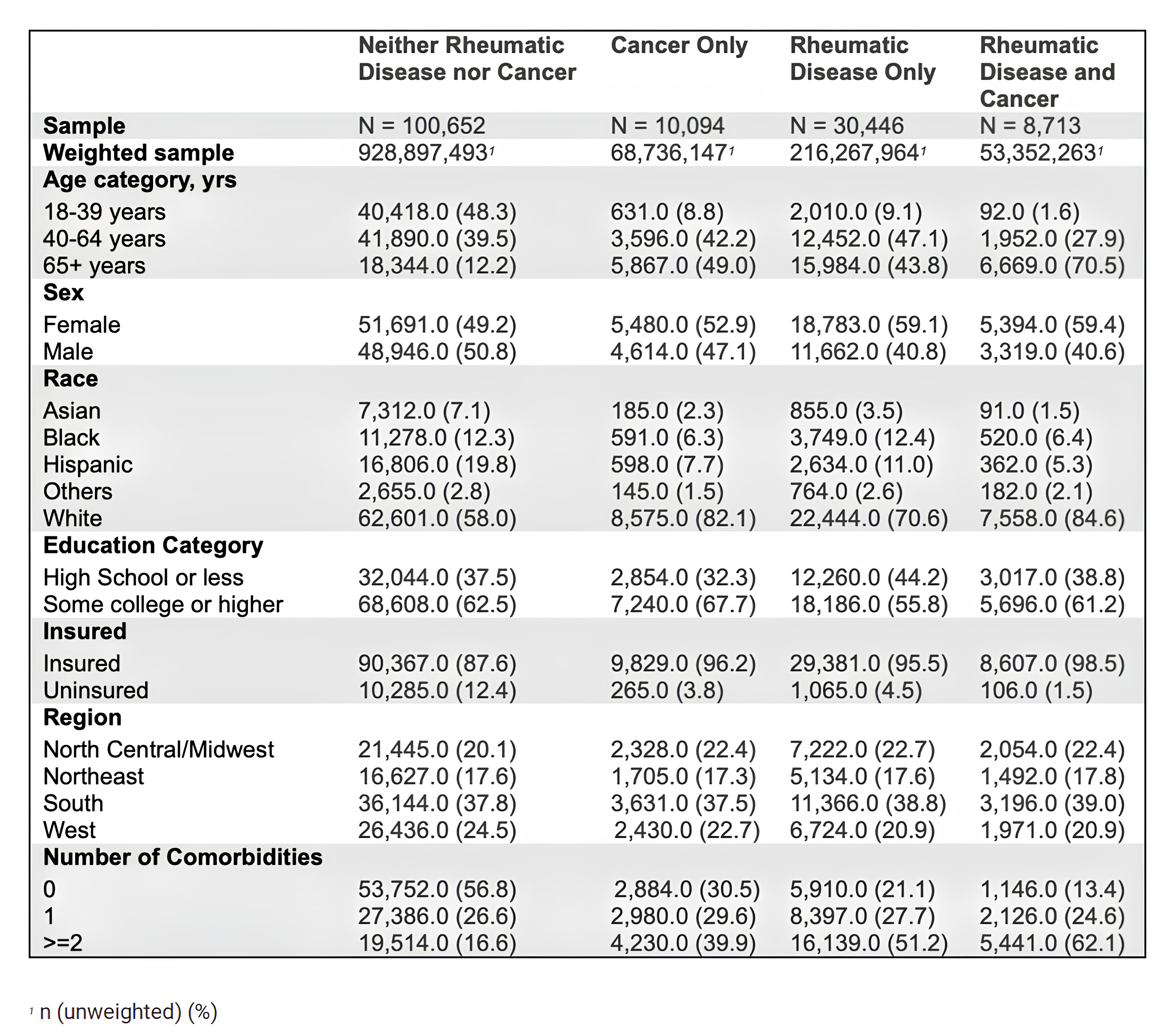Session Information
Date: Tuesday, October 28, 2025
Title: Abstracts: Measures & Measurement of Healthcare Quality (2615–2620)
Session Type: Abstract Session
Session Time: 3:00PM-3:15PM
Background/Purpose: Financial toxicity (FT) is the financial burden of accessing health care, well known in cancer and increasingly seen in rheumatic disease (RD). We compared FT among adults with neither condition, RD only, cancer only, and both.
Methods: We used the National Health Interview Survey, a nationally representative sample of US adults from 2019-2023. Adults were categorized by self-reported RD, including arthritis, rheumatoid arthritis, gout, lupus, or fibromyalgia, and/or cancer. FT was defined as the presence of one or more of the following: financial distress, difficulty paying bills, delayed or forgone care, cost-related medication non-adherence, and food insecurity. Weighted logistic regressions were used to examine associations between disease groups and FT components, adjusting for demographics, comorbidities, and insurance status. To account for baseline differences and insurance coverage, analyses were stratified by age (< 65 versus ≥65 years). Analyses were conducted in RStudio v4.4.1; significance was set at p< 0.05.
Results: A total of 149,905 adults were included, of whom 10,094 (weighted prevalence: 6.3% [95% CI: 6.1%–6.5%]) had cancer only, 30,446 (18.5% [95% CI: 18.2%–18.8%]) had rheumatic disease (RD) only, and 8,713 (4.7% [95% CI: 4.6%–4.9%]) had both RD and cancer. These correspond to approximately 80.5, 235.6, and 59.9 million U.S. adults, respectively. Adults with both RD and cancer were more likely to be aged ≥65 years (70.5%) and had the highest rates of multimorbidity (62.1% with ≥2 comorbidities). Most adults across groups were female and insured, with higher educational attainment in the cancer-only and neither condition (Table 1). In adults under 65, FT was highest in those with RD alone (63.9%) or RD plus cancer (64.3%), compared to 54% in those without either condition. Medication non-adherence was higher in RD groups (16.3% RD only, 19.2% RD with cancer). In adults over 65, FT was most prevalent in those with RD only (41.4%), with financial distress highest in this group (35.1%). Among adults < 65 years, compared to those with neither RD nor cancer, persons with RD alone or in combination with cancer were consistently associated with increased FT across all domains (Figure 1). Among adults ≥65 years, RD remained associated with higher odds of difficulty paying bills, cost-related medication non-adherence, and food insecurity, while cancer alone was not associated with increased financial toxicity and appeared protective in some domains compared to those with neither condition. The combined burden of RD and cancer conferred a similar level of risk as RD alone (Figure 2).
Conclusion: Among younger adults, RD had a stronger association with FT than cancer, with the highest burden seen in those with both. Similar trends were observed among older adults, though with more modest effect sizes. While cancer may lead to short-term high costs, RD imposes a chronic financial burden from ongoing treatment and care. Even among Medicare-insured older adults, FT persists. These findings underscore the need for RD-specific FT assessment tools and greater clinical attention to financial burden, particularly as longer life expectancy amplifies the long-term economic impact of chronic RDs.
 Table 1: Baseline Characteristics of Adults with Cancer and/or RD from the National Health Interview Survey, 2019 to 2023
Table 1: Baseline Characteristics of Adults with Cancer and/or RD from the National Health Interview Survey, 2019 to 2023
.jpg) Figure 1: Adjusted Odds Ratios for Financial Toxicity Outcomes Among Younger Adults ( < 65 years) by Disease Group
Figure 1: Adjusted Odds Ratios for Financial Toxicity Outcomes Among Younger Adults ( < 65 years) by Disease Group
.jpg) Figure 2: Adjusted Odds Ratios for Financial Toxicity Outcomes Among Older Adults (≥65 years) by Disease Group
Figure 2: Adjusted Odds Ratios for Financial Toxicity Outcomes Among Older Adults (≥65 years) by Disease Group
To cite this abstract in AMA style:
Sondhi M, Bansal B, Khandelia H, Lee J, Sattui S, Singh S, Singh N. The Cost of Complexity: Financial Toxicity in Rheumatic Disease, Cancer, and Their Intersection [abstract]. Arthritis Rheumatol. 2025; 77 (suppl 9). https://acrabstracts.org/abstract/the-cost-of-complexity-financial-toxicity-in-rheumatic-disease-cancer-and-their-intersection/. Accessed .« Back to ACR Convergence 2025
ACR Meeting Abstracts - https://acrabstracts.org/abstract/the-cost-of-complexity-financial-toxicity-in-rheumatic-disease-cancer-and-their-intersection/
